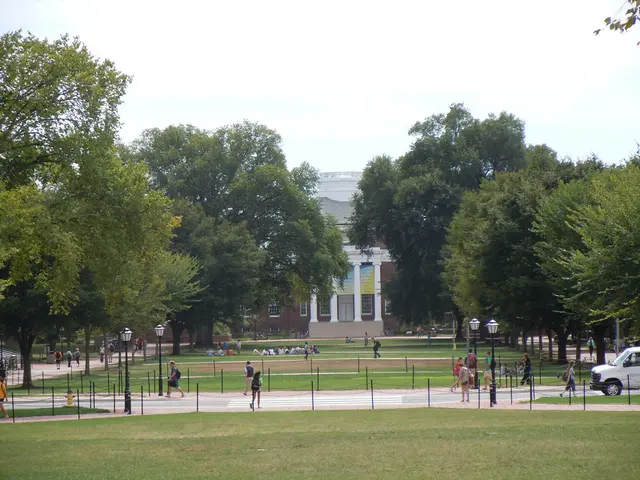Medical Officer faces lawsuit over imposed abortion restriction
In a high-profile legal dispute, the managing director of a Catholic-run clinic in Lippstadt, Hauke Schild, has asserted his right to determine what is done and not done within his company, citing entrepreneurial freedom. However, this claim has come under scrutiny in a case involving Chief Physician Joachim Volz, a gynecologist, who has sued against a ban imposed by the clinic's management, prohibiting abortions except in life-threatening cases for the woman.
Volz, who previously performed medically indicated abortions, including for severe fetal malformations, at a Protestant hospital, found himself in a quandary when the Catholic management forbade such abortions following a merger. This change also applies to Volz’s private practice. The physician argues that this restriction conflicts with medical responsibilities and limits legally permitted healthcare.
The Hamm Labour Court in North Rhine-Westphalia upheld the clinic’s ban, ruling that the Catholic-run hospital is authorized to establish such regulations within its rights as the employer following a merger with another hospital. The implications for women’s healthcare in Germany are significant.
The ruling reinforces the authority of religiously-affiliated hospitals to prohibit abortions beyond the narrow legal exceptions, potentially reducing access to abortion services even in medically indicated cases. This raises concerns about patient rights and the availability of reproductive healthcare in areas served by Catholic institutions.
Public protests involving around 2,000 people denounced the ban, highlighting societal opposition and broader tensions over abortion access in Germany. The demonstration, titled "Stop the Catholic Abortion Ban", was organized by Sarah Gonschorek (Greens) and featured politicians from the federal and state governments of North Rhine-Westphalia, including Britta Haßelmann.
Joachim Volz, the chief physician, has failed in his lawsuit against the Catholic operator of the clinic. Medically indicated abortions are not categorically prohibited in the clinic, but are still permitted in part, according to the judge. Volz, however, believes that the Catholic operator's ban ignores the medical judgment, the will of the patient, and the law.
Volz has stated that he will "almost certainly" appeal the court's decision and is not considering resignation. He has also started a petition under the title "I am a doctor - my help is not a sin!" which has garnered over 232,000 signatures. The legal dispute is likely to continue, as Volz must first examine the reasoning and consult with his legal representatives before making a decision.
During the demo march, Volz displayed a sign with the current number of signatures, which was 231,470. The demonstration passed by the clinic and featured placards with messages such as "Heaven Hell Hypocrisy! Church, set the women free" and "Help and self-determination instead of punishment".
References:
[1] Spiegel Online. (2022, March 23). Der Chefarzt Joachim Volz verliert Klage gegen Abtreibungsverbot der Katholiken. Retrieved from https://www.spiegel.de/politik/deutschland/der-chefarzt-joachim-volz-verliert-klage-gegen-abtreibungsverbot-der-katholiken-a-e8d48c5b-e02e-445c-a12c-283d10f96580
[2] Deutsche Welle. (2022, March 23). German court upholds Catholic hospital's abortion ban. Retrieved from https://www.dw.com/en/german-court-upholds-catholic-hospitals-abortion-ban/a-60974152
- The managing director of a Catholic-run clinic in Lippstadt, Hauke Schild, advocates for entrepreneurial freedom.
- In a legal dispute, Schild defended the clinic's right to make decisions regarding its operations.
- However, this claim has faced scrutiny due to a ban on abortions, imposed on Chief Physician Joachim Volz.
- As a gynecologist, Volz performs medically indicated abortions, yet was prohibited following a merger with the Catholic-run hospital.
- The ban applies to both the clinic and Volz's private practice, leading to conflict with medical responsibilities.
- The restriction allegedly limits legally permitted healthcare services.
- The Hamm Labour Court in North Rhine-Westphalia upheld the clinic's ban, citing the hospital's rights as an employer post-merger.
- The ruling has significant implications for women's healthcare in Germany.
- The court's decision reinforces religiously-affiliated hospitals' authority to prohibit abortions beyond legal exceptions.
- This could potentially reduce access to abortion services even in medically indicated cases.
- The ruling raises concerns about patient rights and reproductive healthcare availability in Catholic-served areas.
- Public protests against the ban resulted in around 2,000 participants.
- The "Stop the Catholic Abortion Ban" demonstration was organized by Sarah Gonschorek (Greens) and featured political representatives.
- Joachim Volz, the suing physician, has failed in his lawsuit thus far.
- The judge has allowed medically indicated abortions in part, but Volz believes the ban ignores medical judgment, patient will, and the law.
- Volz plans to appeal the court's decision, citing incomplete consultation with legal representatives.
- Volz has started a petition entitled "I am a doctor - my help is not a sin!" with over 232,000 signatures.
- During the march, Volz displayed the current number of petition signatures, which stood at 231,470.
- Participants in the demonstration carried placards with messages such as "Heaven Hell Hypocrisy! Church, set the women free".
- The march passed by the clinic and featured signs with statements like "Help and self-determination instead of punishment".
- The legal dispute and the occurring demo highlight societal opposition and tensions over abortion access in Germany.
- The tension between science and religious beliefs has always been a part of medical-conditions discussions.
- In health-and-wellness, sexual-health, and family-health, these disagreements could lead to deeper implications.
- Mental-health, mens-health, and womens-health could also become affected by these religious restrictions.
- The case serves as a reminder of the ongoing need for parenting education and mental-health support.
- The issue of migrants seeking access to healthcare services, especially reproductive healthcare, becomes even more crucial in such contexts.







